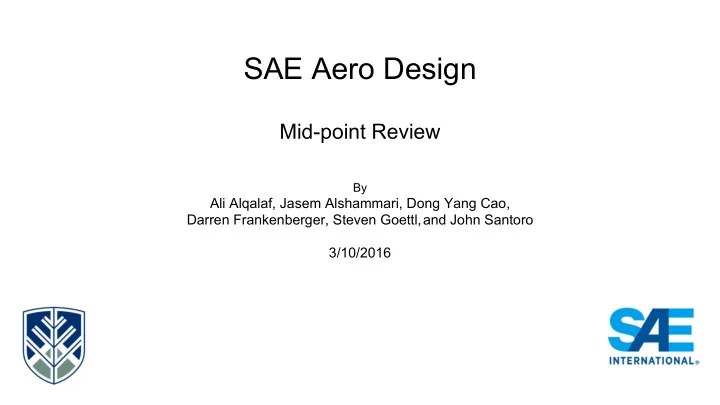

SAE Aero Design Mid-point Review By Ali Alqalaf, Jasem Alshammari, Dong Yang Cao, Darren Frankenberger, Steven Goettl, and John Santoro 3/10/2016
Overview • Introduction • Problem Definition • Need Statement • Project Goals • Objectives • Constraints • Fabrication • Wing • Fuselage • Tail • Electronics • Difficulties • Final Design • Future Modifications • Bill of Materials • Project Plan • Conclusions 2
Introduction ● Build an airplane that adheres to SAE requirements ● Constraints include a maximum combined dimensions of 175 in, specific payload bay area volume, and must have a 1000 W power limiter ● The design and construction phases have concluded ● A final design will be presented 3
Need Statement Northern Arizona University does not have an airplane design to compete in the SAE Aero design competition, so the team is tasked with the design and construction of the airplane. 4
Project Goals • Design and build an aircraft that adheres to the SAE Aero competition requirements • Gain valuable knowledge in the mechanical engineering design and manufacturing processes, specifically in airplane design • Compile an excellent report detailing the design and manufacturing processes and orally present the final design • Win the SAE Aero Regular class competition 5
Objectives Objective Measurement Units of Measurement Carry max payload Weight Pounds Force (lbf) Carry a payload from Distance Feet (ft) point A to B Small turning radius Distance Feet (ft) 6
Constraints ● Freestanding aircraft must not exceed a combined length, width and height of 175 in ● Aircraft must be powered by a commercially available lithium-polymer battery pack ● Must use a new 2015 version 1000 W power limiter provided by Neumotors.com ● Interior payload bay must be smooth and dimensions must be 10’’x4’’ x4’’ (length, width, height) with a tolerance of +0.125” 7
Constraints ● Payload must be secured to an airframe, with payload plates ● Airplane must land and take off within 200 ft ● Must complete all tasks within 180 s 8
Fabrication - Wing ● 30 ribs ○ 14 ailerons ● 6 balsa dowels ● 3D printed center structure ● Rectangular spar ● Aluminum spar 9
Fabrication - Wing 10
Fabrication - Wing 11
Fabrication - Wing 12
Fabrication - Fuselage 13
Fabrication - Fuselage 14
Fabrication - Fuselage • Pieces were notched out to connect them efficiently • Tape to make sure the pieces remained in tact while glue dried • Payload bay and tail end of the plane are access points 15
Fabrication - Tail Twin tail 16
Fabrication - Tail 17
Fabrication - Tail 18
Functional Diagram 19
Fabrication - Electronics 20
Fabrication Difficulties Monokote • Miscellaneous essential parts • 21
Final Design Final Dimensions-99” Width x 55” Length x 19” Height • 173” Total Linear Dimension • Heavy Duty Tricycle Landing Gear • 4” Wheels • Stabilator Vertical and Horizontal Control Surfaces • 22.2V DC Motor • 18x12 Propeller • 22
Final Design 23
Final Design 24
Final Design 25
Future Modifications Cowling • Vertical Stabilizers - support bar on top • Adjust center of gravity • 26
Final Design 27
28
Project Plan Task W 1 W 2 W 3 W 4 W 5 W 6 W 7 W 8 W 9 W 10 W 11 W 12 W 13 W 14 W 15 W 16 Fuselage design Wing construction Tail design Parts for Fuselage and Tail Fuselage construction Tail construction Landing gear design Fabricate airplane parts Airplane construction Finalize airplane construction Test/modify airplane Hardware review 1 Hardware review 2 Hardware review 3 Hardware review 4 Midpoint presentation Hardware review 5 Walkthrough Presentation UGRADS Presentations 29
Conclusions Fabrication of the airplane has been completed • Minor modifications will be made to the final design • Testing will begin shortly • 30
References [1] What-When-How, “Tail design”, Conventional Tail, T-tail, Dual Tail, Triple Tail and Twin Tail. Available: what- when-how.com. [2] National Aeronautics and Space Administration, ”structures and materials”, aircraft background, P3-4. [3] P. J. Pritchard, Introduction to Fluid Mechanics 8th Edition. Fox and McDonald. Wiley, 2011. [4] M. H. Sadraey, Aircraft design: a systems engineering approach. Hoboken, New Jersey: Wiley, 2012. [5] “Airfoil Tools,” Airfoil Tools. [Online]. Available at: http://airfoiltools.com/. [Accessed: 2015]. [6] Flight calculations. Ecalc Calc for Airplanes. [Online]. Available at: http://www.ecalc.ch/ 31
Recommend
More recommend